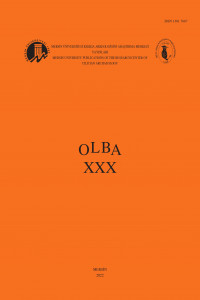Öz
This study presents a detailed examination of a metal figurine found during the 2019
excavations at Murat Höyük, located on the bank of the Murat River in the Solhan district of
the Province Bingöl in Eastern Anatolia. Because the mound was to be inundated by the Aşağı
Kaleköy hydroelectric dam, extensive salvage excavations were conducted at the site in 2019 under
the directorship of the Elazığ Museum. Four main settlement phases (Medieval, Middle Iron, Early
Iron, Early Bronze) were documented at the site with the earliest habitation dating to the Early
Bronze Age III (2500-2200 BC).
While figurines shaped out of clay, stone, and marble are more common in the
archaeological record of Early Bronze Age (EBA) Anatolia, and metal figurines are relatively rare,
a metal figurine (‘statuette’) was discovered in the EBA settlement level of Murat Höyük. In terms
of typological and stylistic details, the metal figurine of Murat Höyük appears unique in the 3rd
millennium records of Mesopotamia, the Aegean, and the Balkans. The figurine depicts a standing
nude with stylized hands and feet. Eye-sockets are marked as shallow pits, while the mouth is not
indicated. Arms are stretched out on both sides; head is slightly inclined to the left; breasts are
fashioned as appliqué protrusions; and pubic triangle is indicated with incised lines. The fact that
stone mold and crucible fragments were found in the same level of the site suggests that the object
was most probably produced locally by casting. Casting defects (flash lines) are observable on the
surface. In this study, based on a comparative iconographic examination, we propose that a goddess
is depicted here. With its unique characteristics, the Murat Höyük goddess figurine is a significant
contribution to the repertoire of metal ‘figurines’ in Anatolia, Syria, and Mesopotamia with broader
implications about EBA metallurgy, art, and belief systems
Anahtar Kelimeler
Eastern Anatolia Bingöl Early Bronze Age Figurine Metalworking Goddess.
Kaynakça
- Akurgal 1962 Akurgal, E., The Art of The Hittites, New York. Alp 1974 Alp, S., “Istar auf dem Karahöyük”, Mansel'e Armağan - Mélanges Mansel (ed. U.B. Alkım), 703-707. Ankara. Arık 1937 Arık, R. O., Türk Tarih Kurumu Tarafından Yapılan Alaca Höyük Hafriyatı: 1935’teki Çalışmalara ve Keşiflere Ait İlk Rapor, Ankara. Atakuman 2017 Atakuman, Ç., “Figurines of the Anatolian Early Bronze Age: the assemblage from Koçumbeli-Ankara”, Anatolian Studies 67, 85-108
Öz
This study presents a detailed examination of a metal figurine found during the 2019
excavations at Murat Höyük, located on the bank of the Murat River in the Solhan district of
the Province Bingöl in Eastern Anatolia. Because the mound was to be inundated by the Aşağı
Kaleköy hydroelectric dam, extensive salvage excavations were conducted at the site in 2019 under
the directorship of the Elazığ Museum. Four main settlement phases (Medieval, Middle Iron, Early
Iron, Early Bronze) were documented at the site with the earliest habitation dating to the Early
Bronze Age III (2500-2200 BC).
Anahtar Kelimeler
: Eastern Anatolia Bingöl Early Bronze Age Figurine Metalworking Goddess
Kaynakça
- Akurgal 1962 Akurgal, E., The Art of The Hittites, New York. Alp 1974 Alp, S., “Istar auf dem Karahöyük”, Mansel'e Armağan - Mélanges Mansel (ed. U.B. Alkım), 703-707. Ankara. Arık 1937 Arık, R. O., Türk Tarih Kurumu Tarafından Yapılan Alaca Höyük Hafriyatı: 1935’teki Çalışmalara ve Keşiflere Ait İlk Rapor, Ankara. Atakuman 2017 Atakuman, Ç., “Figurines of the Anatolian Early Bronze Age: the assemblage from Koçumbeli-Ankara”, Anatolian Studies 67, 85-108
Ayrıntılar
| Birincil Dil | İngilizce |
|---|---|
| Konular | Arkeoloji |
| Bölüm | Araştırma Makalesi |
| Yazarlar | |
| Yayımlanma Tarihi | 5 Mayıs 2022 |
| Yayımlandığı Sayı | Yıl 2022 Sayı: XXX |


